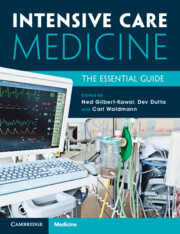Book contents
- Intensive Care Medicine
- Intensive Care Medicine
- Copyright page
- Dedication
- Dedication
- Epigraph
- Contents
- Contributors
- Preface
- Foreword
- Abbreviations
- Section 1 Resuscitation and Management of the Acutely Ill Patient
- Section 2 Diagnosis, Assessment, Investigation, Monitoring and Data Interpretation
- Domain 3 Disease Management: Recognition, Causes and Management
- Section 4 Therapeutic Interventions and Organ Support
- Domain 5 Practical Procedures
- Section 6 Perioperative Care
- Introduction
- Risk Scoring and ICU Triage
- Pre-optimisation/Prehabilitation
- Intraoperative Care
- Perioperative Fluid Management
- Post-operative Care
- Evidence for Intensive Care in High-Risk Surgical Patients
- Conclusion
- Introduction
- Handover
- Examination
- Investigations in the Post-operative Setting
- Introduction
- Criteria for CCU Admission Following Craniotomy
- Interventions Requiring CCU Admission
- Complications Requiring CCU Admission
- Pain Management
- Conclusion
- Introduction
- Cardiovascular
- Renal Failure
- Hepatorenal Syndrome
- Ventilation
- Allograft Function
- Infection
- Nutrition
- Post-operative Complications in the ICU
- Introduction
- Monitoring
- Haemodynamics
- Right Ventricular Failure
- Rate and Rhythm
- Fluids and Renal Function
- Bleeding
- Immunosuppression and Infection
- Acute Rejection
- Non-cardiac Surgery in Heart Transplant Patients
- Introduction
- Surgery and Monitoring
- Management after Lung Transplant
- Complications after Lung Transplant
- Introduction
- Severity of Injury
- Problems and Treatment Strategies in the ICU
- Introduction
- Multi-modal, Opioid-Sparing Analgesia
- Effective Circulating Volume/Adequate Resuscitation
- Addressing the Need for Anti-microbial Treatment
- Nutritional Support
- Prophylaxis against ICU Complications
- Abdominal Catastrophes
- 6.1 Management of Pre- and Post-operative Care of the High-Risk Surgical Patient
- 6.2 Management of the Critical Care Patient Following Cardiac Surgery
- 6.3 Management of the Critical Care Patient Following Craniotomy
- 6.4 Management of the Critical Care Patient Following Liver Transplant
- 6.5 Management of the Critical Care Patient Following Heart Transplant
- 6.6 Management of the Critical Care Patient Following Lung Transplant
- 6.7 Pre- and Post-operative Management of the Critical Care Trauma Patient
- 6.8 Management of the Critical Care Patient Following Major Abdominal Surgery
- Section 7 Comfort and Recovery
- Section 8 End-of-Life Care
- Section 9 Paediatric Care
- Section 10 Transport
- Section 11 Professionalism, Patient Safety, Governance and Health Systems Management
- Index
- References
6.3 - Management of the Critical Care Patient Following Craniotomy
from Section 6 - Perioperative Care
Published online by Cambridge University Press: 27 July 2023
- Intensive Care Medicine
- Intensive Care Medicine
- Copyright page
- Dedication
- Dedication
- Epigraph
- Contents
- Contributors
- Preface
- Foreword
- Abbreviations
- Section 1 Resuscitation and Management of the Acutely Ill Patient
- Section 2 Diagnosis, Assessment, Investigation, Monitoring and Data Interpretation
- Domain 3 Disease Management: Recognition, Causes and Management
- Section 4 Therapeutic Interventions and Organ Support
- Domain 5 Practical Procedures
- Section 6 Perioperative Care
- Introduction
- Risk Scoring and ICU Triage
- Pre-optimisation/Prehabilitation
- Intraoperative Care
- Perioperative Fluid Management
- Post-operative Care
- Evidence for Intensive Care in High-Risk Surgical Patients
- Conclusion
- Introduction
- Handover
- Examination
- Investigations in the Post-operative Setting
- Introduction
- Criteria for CCU Admission Following Craniotomy
- Interventions Requiring CCU Admission
- Complications Requiring CCU Admission
- Pain Management
- Conclusion
- Introduction
- Cardiovascular
- Renal Failure
- Hepatorenal Syndrome
- Ventilation
- Allograft Function
- Infection
- Nutrition
- Post-operative Complications in the ICU
- Introduction
- Monitoring
- Haemodynamics
- Right Ventricular Failure
- Rate and Rhythm
- Fluids and Renal Function
- Bleeding
- Immunosuppression and Infection
- Acute Rejection
- Non-cardiac Surgery in Heart Transplant Patients
- Introduction
- Surgery and Monitoring
- Management after Lung Transplant
- Complications after Lung Transplant
- Introduction
- Severity of Injury
- Problems and Treatment Strategies in the ICU
- Introduction
- Multi-modal, Opioid-Sparing Analgesia
- Effective Circulating Volume/Adequate Resuscitation
- Addressing the Need for Anti-microbial Treatment
- Nutritional Support
- Prophylaxis against ICU Complications
- Abdominal Catastrophes
- 6.1 Management of Pre- and Post-operative Care of the High-Risk Surgical Patient
- 6.2 Management of the Critical Care Patient Following Cardiac Surgery
- 6.3 Management of the Critical Care Patient Following Craniotomy
- 6.4 Management of the Critical Care Patient Following Liver Transplant
- 6.5 Management of the Critical Care Patient Following Heart Transplant
- 6.6 Management of the Critical Care Patient Following Lung Transplant
- 6.7 Pre- and Post-operative Management of the Critical Care Trauma Patient
- 6.8 Management of the Critical Care Patient Following Major Abdominal Surgery
- Section 7 Comfort and Recovery
- Section 8 End-of-Life Care
- Section 9 Paediatric Care
- Section 10 Transport
- Section 11 Professionalism, Patient Safety, Governance and Health Systems Management
- Index
- References
Summary
Key Learning Points
1. Most patients undergoing elective supra-tentorial craniotomy can be discharged safely to the neurosurgical ward.
2. The use of vasoactive agents and insulin infusions and the need for cardiovascular monitoring and intracranial pressure management are among the most common interventions requiring critical care admission.
3. Intraoperative complications requiring critical care admission include, but are not exclusive to, failed endotracheal extubation, cardiovascular instability, extensive blood loss and cerebral swelling.
4. Post-operative complications usually involve respiratory, cardiovascular or central nervous systems. Metabolic derangements and infectious diseases may also warrant treatment and close monitoring in critical care.
5. Use of opioids, when carefully titrated, is considered safe in neurological patients. Opioids should be always considered, because craniotomies are typically painful procedures.
- Type
- Chapter
- Information
- Intensive Care MedicineThe Essential Guide, pp. 632 - 634Publisher: Cambridge University PressPrint publication year: 2021



